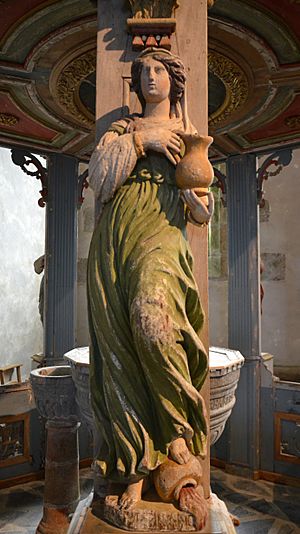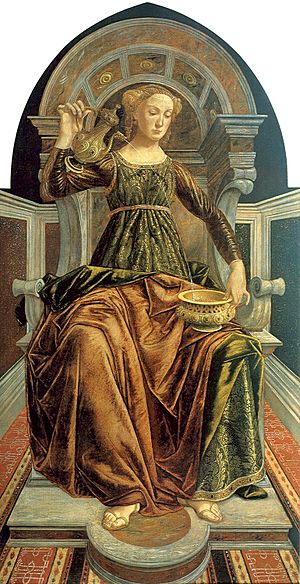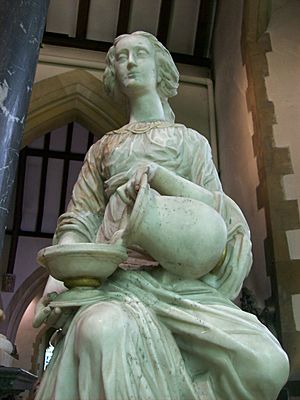Temperance (virtue) facts for kids
Temperance means having control over yourself. It's about choosing to hold back from doing things, even if you want to do them. This could be stopping yourself from getting angry, being too proud, or spending too much money. It's also about being calm and forgiving instead of seeking revenge.
Many wise people, like religious leaders, thinkers, and even modern psychologists, see temperance as a good quality or virtue. It has been important in many cultures for a long time.
In old pictures, temperance is often shown as a woman pouring water from one pot into another. This shows balance. It's one of the main good qualities in Western thought, found in Greek philosophy and Christianity. You can also find similar ideas in Eastern traditions like Buddhism and Hinduism.
In a modern study called positive psychology, temperance is one of six main virtues. The others are wisdom, courage, kindness, justice, and transcendence (connecting to something bigger than yourself). Temperance is about controlling too much of anything. It includes being pure, modest, humble, and having self-control. It also means being welcoming to others and forgiving. Each of these helps control strong feelings like being too proud or angry.
Sometimes, "temperance" also means choosing not to drink alcohol, which is called teetotalism. This idea was part of the temperance movement in the past. It can also mean drinking alcohol in a very careful and controlled way.
Religions

Ideas about temperance appear in many cultures and times.
Buddhism
Temperance is a key part of the Eightfold Path in Buddhism. The Buddha taught the Noble Eightfold Path as a Middle Way. This path avoids the extremes of too much pleasure and hurting oneself. Two of the five precepts (main rules) in Buddhism are about temperance: avoiding "misconduct concerning sense pleasures" and avoiding drunkenness.
Christianity
In Christianity, temperance is a good quality that helps control the desire for pleasures. It brings balance to how we use things. The Old Testament and New Testament both talk about temperance as a main virtue. Forgiveness is central, and self-control is one of the Fruits of the Spirit.
The Bible uses the word "temperance" to mean self-control or discipline. Christian thinkers like Thomas Aquinas supported the ancient Greek virtues, including temperance. It is seen as a virtue that helps fight against the sin of gluttony (eating or drinking too much).
Hinduism
In Hinduism, the idea of dama (Sanskrit: दम) is like temperance. It means self-control and self-restraint. The Brihadaranyaka Upanishad says that three qualities of a good person are self-restraint (damah), kindness to all living things (daya), and giving to charity (daana). In Hindu yoga, self-restraint is part of the yamas (Sanskrit: यम).
Hindu texts list virtues needed for a moral life. Dama (temperance) is often on these lists. For example, the Manusamhita first listed ten virtues, including Dama. Later, this list was shortened to five, still including Dama.
Five types of self-restraint are important in Hindu thought:
- Don't use violence that harms others.
- Don't spread lies.
- Don't steal from others.
- Be loyal to your partner.
- Don't be greedy.
Self-restraint includes your actions, words, and thoughts. It's believed to prevent bad karma, which can come back to you later. It also helps prevent hurting others, because in Hinduism, hurting others is seen as hurting yourself.
Jainism
Temperance in Jainism is deeply connected to its five main vows:
- Ahimsa (nonviolence)
- Satya (truth)
- Brahmacharya (chastity or celibacy)
- Asteya (not stealing)
- Aparigraha (not being too possessive)
In Jainism, the vow of Ahimsa means not just avoiding physical violence. It also means avoiding violence in thoughts, speech, or actions.
On Samvatsari, the last day of the Paryushan festival, Jains say Micchāmi Dukkaḍaṃ to friends and family. This means "may all my faults be forgiven." Jains also use this phrase throughout the year to ask for forgiveness for mistakes.
Modern Groups
Values of temperance are still taught today by groups like the Boy Scouts. In positive psychology, temperance includes four main strengths: forgiveness, humility, carefulness, and self-control.
See also
 In Spanish: Templanza para niños
In Spanish: Templanza para niños
- Asceticism
- Christian ethics
- Moral character
- Seven Deadly Sins
- Seven Heavenly Virtues
- Sophrosyne
- Temperance (Tarot card)
- Virtue ethics
 | Bayard Rustin |
 | Jeannette Carter |
 | Jeremiah A. Brown |



